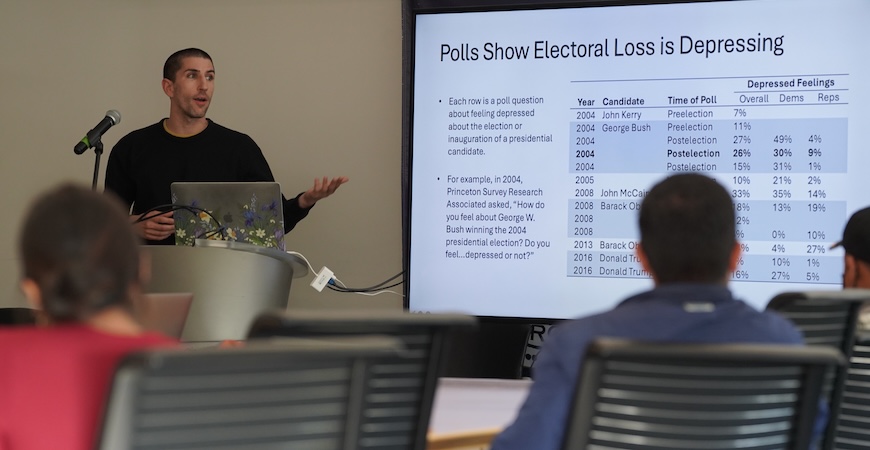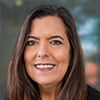
If it seems anxiety around elections is at an all-time high, then political groups have done their jobs.
"It's very conscious, it's very calculated," said UC Merced political science Professor Anil Menon, displaying a pile of negative campaign mailers during a panel discussion on campus Wednesday.
Menon was among a group of experts who highlighted their research to help make sense of the current political environment and offer strategies for managing stress and coping with emotions, evaluating political rhetoric, navigating polarization and sifting through the information landscape.
The event was sponsored by the UC Merced Library, the Department of Political Science, the Center for Analytical Political Engagement and UC Merced Health Promotion.
Research has found that triggering emotions can impact elections, Menon said.
"When you have decided to vote for someone and you get exposed to negativity about that person, it reduces your likelihood to go out and vote," he said. "There's a lot of interest in getting people who have made up their mind to stay at home. It's strategic and targeted."
And while it may seem that the country has always been polarized, that isn't the case, said political science Professor Matthew Hibbing .
"This is a relatively new big set of problems," he said. In 1950, the American Political Science Association issued a report essentially calling for more polarization.
"How do we get people to care and understand politics?" Hibbings said the report asked. "They're so checked out and indifferent."
That characterization feels "a little naïve" today as politics in the United States have swung so far the other way. "Nobody would say that Kamala Harris and Donald Trump are just two sides of the same coin."
The chasm between people on different ends of the political spectrum is a uniquely American quality, Hibbings said.
"There's good comparative data on polarization. This isn't a worldwide phenomenon."
In response to a question from a student attendee, Hibbing said there is cause for expectation that the country won't always be so fractious.
"With the caveat that making predictions is a terrible thing to do when you're a political scientist, there is reason to be optimistic this is not some kind of trend that will continue in perpetuity," he said. "This is driven by people who are very engaged and it does feel like there is a ceiling to how many there are who are treating politics as a form of entertainment.
"It's not going to challenge the NFL anytime soon."
In the meantime, how do you manage the deluge of information you're getting during election season, and determine what's accurate and what is vitriolic hyperbole?
One way is by expanding your sources for news, said Bronwen Maxson, head of research and learning services for the UC Merced Library. She said the concept of an echo chamber - only seeking opinions that back up what you already think - is nothing new. But with so many sources online and algorithms determining what we see on our social media feeds, many people have developed a "filter bubble," which means that the content we see and respond to tends to serve up more of what we already believe.
"Intentionally follow diverse viewpoints," Maxson said. "Look for small, independent news outlets. Follow the other side. Balance your national and international news consumption with local news."
She said she advocates the SIFT method:
- Stop
- Investigate the source
- Find better coverage
- Trace claims, quotes and media to the original content.
Menon agreed.
"Look at the source of the ad campaign," he said. "Don't let the immediate emotional reaction overwhelm reasoning - the facts on the ground."
And when the source of anxiety isn't a campaign mailer or text message but, say, your uncle at a family dinner?
"Take deep breaths," Menon said. "Getting that minimum amount of distance between you and the emotional rhetoric will allow you to have a more reasonable conversation."
Another option is to be intentional about situations you allow yourself to get into, said political science Professor Christopher Ojeda. He used a nonpolitical example of going to a scary movie with a friend.
"You can opt out of it," he said. "It's in your control. Or maybe you decide I am going to the movie to support my friend but you can modify the situation - watch it at home, with the lights on and a smaller screen to reduce the amount of fear you feel."
People can also deploy their attention elsewhere and modulate their response.
"Reduce your exposure," he said. "Take a break from the news."
And, pointing at polls taken throughout the last several elections, Ojeda said, don't think this is the first time politics has caused stress.
"Feeling depressed after an election is something that happens regularly."
The panelists said it's good to remember that no matter what happens in the election, a good portion of the population is going to be distressed. A little empathy can go a long way toward healing a divided nation.
"Try to think through why they're in the place they are rather than dismissing it offhand as crazy," Menon said. "Try to engage in conversation, which I can say is extremely hard."
And if you're still feeling stressed as Election Day nears?
"Here's a bonus strategy," said Maxson, who closed her presentation with a photo of a cat playing in bubbles. "Look at pictures of animals."




 Public Information Officer
Public Information Officer

